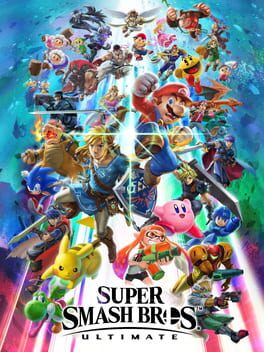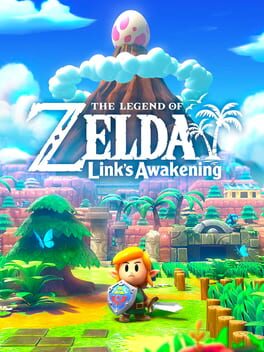NatRop2
80 reviews liked by NatRop2
Smash ultimate is pretty good, like that needs saying. Now I'm not the biggest fighter guy but I do thoroughly enjoy ultimate. It has a great selection of characters even without the expansion packs (which I also haven't bought) as well as a great variety of stages. The campaign is nothing to write home about but it's fine for what it is.
Tried to give this game another chance since I felt maybe I was too hard on it but no, it’s even worse. It is glitchy to the point of being unplayable with Link being barely controllable, areas not loading correctly, and a statue from later in the game randomly showing up everywhere and blocking the way. Appalled at Nintendo for releasing a game in this state.
Edit (2023)
I originally wrote this in a salty mood. Now I still think the dungeons aren't particularly fun - they're nice when you're not super stuck or dying to a bat - but I like the jank ambition of OoT a lot. And the atmosphere is still great. And all the npcs and little item interactions are great .. I sort of wish they'd try making this scale of Zelda again, but with the better design knowhow of 2023.
--
In summary: https://twitter.com/han_tani2/status/1529794146617421824
(Edited to add some positive things about the spatial concepts of the dungeons and towns)
Would you put a health bar into a 3D block / hidden object game, so if you die at the end of three puzzles, you have to redo all of them? Probably not!
Now imagine that there was a game that did this - and in fact, it sold well - not only that, but it became so unimaginably popular, that its idea - adding a health bar to a 3D puzzle game - became considered 'good practice' in thousands of games, and in fact, this game went on to have dozens of sequels with the same idea: put a health bar in a puzzle game.
Ocarina of Time strikes me as absurd. Having played through the water temple, there hasn't been a single truly interesting idea in any of the dungeons. The base mechanics are so flat and uninteresting - imprecise combat (even with the Z targeting), finicky auto-jumping, slow climbing, a camera that almost always points into the ground, and the need to walk slowly everywhere. When the atmosphere and setting do work, it feels more like a welcome distraction against the task of trying to play through the game.
Every room in OoT boils down to:
- Get oriented, see the obvious thing you need to do, and then do it.
- Sometimes doing it is hard: you might die (often from an enemy that's incidentally in the room, and not the conceptual focus of room puzzle), you might fall and need to re-do rooms. Sometimes it's slow and boring: you need to push a block around some ice.
(One room in the Water temple carefully makes you shoot a water-level-changing crystal 5 times to make it through. Nothing about this idea is interesting, the solution is obvious from the get go!)
Or worse, it might be a combat room, where you're subjected to a camera and combat system that's impossible to aim with, with enemies whose design concepts tend to be "invincible 90% of the time, maybe vulnerable in a weird, awkward window".
Every dungeon is dozens of these rooms stitched together, in a way where it's easy to miss a key you need, only to find you need it later - after completing 10 minutes of boring puzzle rooms. Then, you get to backtrack, and do the boring puzzle rooms again.
In this way, OoT feels like it was a 2D Puzzle game on paper, naive concepts hackily translated into 3D with a combat system grafted on.
Each new item you get is a failed answer to 'how do we make this interesting?' Pointing your bow around the room, bombing a dodongo, equipping the iron boots over and over. These new items are never fundamentally interesting, they just create a new paint job for a switch sitting on a ledge.
To OoT's defense, I think it succeeds with interesting spatial setups and dramatic pacing (deku tree web, etc, water temple water level) but the moment to moment execution of how you traverse those setpieces just really doesn't work. It's super cool to think about the process of climbing to the ceiling of the Fire Temple, but it's kind of shrug when you think about the moment to moment process of getting there.
The layout of the world is cool (on paper), it's just a slog to walk across. Likewise with the execution of the towns like Zora's Domain or Goron City - they're neat to be in, up until you need to Do Something.
If you knew exactly what to do and when to do it (to avoid backtracking or costly dead-end-investigation), I think this game would be a lot more tolerable. I can see why it became people's favorites if you're intimately familiar with it - breezing through dungeons and slowly making progress is actually a little fun.
Unfortunately (for this review) it doesn't make sense to review something in such a context of having played it 10 times...
--
In some ways, OoT fundamentally feels like a mix of Hidden Object games, the puzzle genre, and even mystery games/JRPGs. It's less a visionary step into 3D than it appears, it's more a hackjob of genres whose saving grace was the production value, hang-out-vibes and atmosphere.
It's very easy to get stuck or lost in the sections between dungeons. E.g., stopping the goron and waiting a minute for it to uncurl, in order to get into the entrance to the Fire Temple. And it's all hampered by slow movement and easily getting disoriented, making what might be a fairly straightforward puzzle into a nightmare.
--
What angers me about this game the most is how much Nintendo - and nostalgic developers - doubled
down on the travesty of mechanics the game has. Having a terrible core moveset, tons of stupid items with one-off uses has become 'good practice'. You can probably find a dozen youtube videos on what makes OoT's dungeons "work". None of the fundamentals here are 'good' - they're merely passable ideas that can become palatable through fancy art or story design.
To me, every game reproducing these ideas feels like a child-like grasping at recreating the magic of childhood favorite. And they ironically miss the point: what does manage to work about OoT is NOT those fundamentals of bad puzzles and combat and poor level design, it's the atmosphere and tone, it's the fun of uncovering a dungeon.
Even future Zelda games do this. I don't know how they became so fixated on this uncomfortable mix of tedious puzzles and sloppy action.
Most of what is required in OoT to progress the game is at best calmingly repetitive (it can be fun to breeze through a dungeon and slowly uncover its treasures), and at worst offensively tedious.
What's good about OoT is the strange NPCs, the quiet little subplots on how parts of the world change over time, the random horror, the way you can kind of just hang out and roll around in it. The sense of inhabiting a grand myth. But even that, to an extent, feels cheapened by a story that's too willing to make everything you do as an adult easily fix every single problem. The Kokiri Forest comes back to life! All the Gorons are safe! Zora's Domain melts!
As far as Japanese Anime story set-ups go, Young Link's stuff was not bad. But the follow through in Adult Link's repetitive romp through dungeons, at least through the Water Temple, feels like it's just going through the motions.
--
I originally wrote this in a salty mood. Now I still think the dungeons aren't particularly fun - they're nice when you're not super stuck or dying to a bat - but I like the jank ambition of OoT a lot. And the atmosphere is still great. And all the npcs and little item interactions are great .. I sort of wish they'd try making this scale of Zelda again, but with the better design knowhow of 2023.
--
In summary: https://twitter.com/han_tani2/status/1529794146617421824
(Edited to add some positive things about the spatial concepts of the dungeons and towns)
Would you put a health bar into a 3D block / hidden object game, so if you die at the end of three puzzles, you have to redo all of them? Probably not!
Now imagine that there was a game that did this - and in fact, it sold well - not only that, but it became so unimaginably popular, that its idea - adding a health bar to a 3D puzzle game - became considered 'good practice' in thousands of games, and in fact, this game went on to have dozens of sequels with the same idea: put a health bar in a puzzle game.
Ocarina of Time strikes me as absurd. Having played through the water temple, there hasn't been a single truly interesting idea in any of the dungeons. The base mechanics are so flat and uninteresting - imprecise combat (even with the Z targeting), finicky auto-jumping, slow climbing, a camera that almost always points into the ground, and the need to walk slowly everywhere. When the atmosphere and setting do work, it feels more like a welcome distraction against the task of trying to play through the game.
Every room in OoT boils down to:
- Get oriented, see the obvious thing you need to do, and then do it.
- Sometimes doing it is hard: you might die (often from an enemy that's incidentally in the room, and not the conceptual focus of room puzzle), you might fall and need to re-do rooms. Sometimes it's slow and boring: you need to push a block around some ice.
(One room in the Water temple carefully makes you shoot a water-level-changing crystal 5 times to make it through. Nothing about this idea is interesting, the solution is obvious from the get go!)
Or worse, it might be a combat room, where you're subjected to a camera and combat system that's impossible to aim with, with enemies whose design concepts tend to be "invincible 90% of the time, maybe vulnerable in a weird, awkward window".
Every dungeon is dozens of these rooms stitched together, in a way where it's easy to miss a key you need, only to find you need it later - after completing 10 minutes of boring puzzle rooms. Then, you get to backtrack, and do the boring puzzle rooms again.
In this way, OoT feels like it was a 2D Puzzle game on paper, naive concepts hackily translated into 3D with a combat system grafted on.
Each new item you get is a failed answer to 'how do we make this interesting?' Pointing your bow around the room, bombing a dodongo, equipping the iron boots over and over. These new items are never fundamentally interesting, they just create a new paint job for a switch sitting on a ledge.
To OoT's defense, I think it succeeds with interesting spatial setups and dramatic pacing (deku tree web, etc, water temple water level) but the moment to moment execution of how you traverse those setpieces just really doesn't work. It's super cool to think about the process of climbing to the ceiling of the Fire Temple, but it's kind of shrug when you think about the moment to moment process of getting there.
The layout of the world is cool (on paper), it's just a slog to walk across. Likewise with the execution of the towns like Zora's Domain or Goron City - they're neat to be in, up until you need to Do Something.
If you knew exactly what to do and when to do it (to avoid backtracking or costly dead-end-investigation), I think this game would be a lot more tolerable. I can see why it became people's favorites if you're intimately familiar with it - breezing through dungeons and slowly making progress is actually a little fun.
Unfortunately (for this review) it doesn't make sense to review something in such a context of having played it 10 times...
--
In some ways, OoT fundamentally feels like a mix of Hidden Object games, the puzzle genre, and even mystery games/JRPGs. It's less a visionary step into 3D than it appears, it's more a hackjob of genres whose saving grace was the production value, hang-out-vibes and atmosphere.
It's very easy to get stuck or lost in the sections between dungeons. E.g., stopping the goron and waiting a minute for it to uncurl, in order to get into the entrance to the Fire Temple. And it's all hampered by slow movement and easily getting disoriented, making what might be a fairly straightforward puzzle into a nightmare.
--
What angers me about this game the most is how much Nintendo - and nostalgic developers - doubled
down on the travesty of mechanics the game has. Having a terrible core moveset, tons of stupid items with one-off uses has become 'good practice'. You can probably find a dozen youtube videos on what makes OoT's dungeons "work". None of the fundamentals here are 'good' - they're merely passable ideas that can become palatable through fancy art or story design.
To me, every game reproducing these ideas feels like a child-like grasping at recreating the magic of childhood favorite. And they ironically miss the point: what does manage to work about OoT is NOT those fundamentals of bad puzzles and combat and poor level design, it's the atmosphere and tone, it's the fun of uncovering a dungeon.
Even future Zelda games do this. I don't know how they became so fixated on this uncomfortable mix of tedious puzzles and sloppy action.
Most of what is required in OoT to progress the game is at best calmingly repetitive (it can be fun to breeze through a dungeon and slowly uncover its treasures), and at worst offensively tedious.
What's good about OoT is the strange NPCs, the quiet little subplots on how parts of the world change over time, the random horror, the way you can kind of just hang out and roll around in it. The sense of inhabiting a grand myth. But even that, to an extent, feels cheapened by a story that's too willing to make everything you do as an adult easily fix every single problem. The Kokiri Forest comes back to life! All the Gorons are safe! Zora's Domain melts!
As far as Japanese Anime story set-ups go, Young Link's stuff was not bad. But the follow through in Adult Link's repetitive romp through dungeons, at least through the Water Temple, feels like it's just going through the motions.
--





